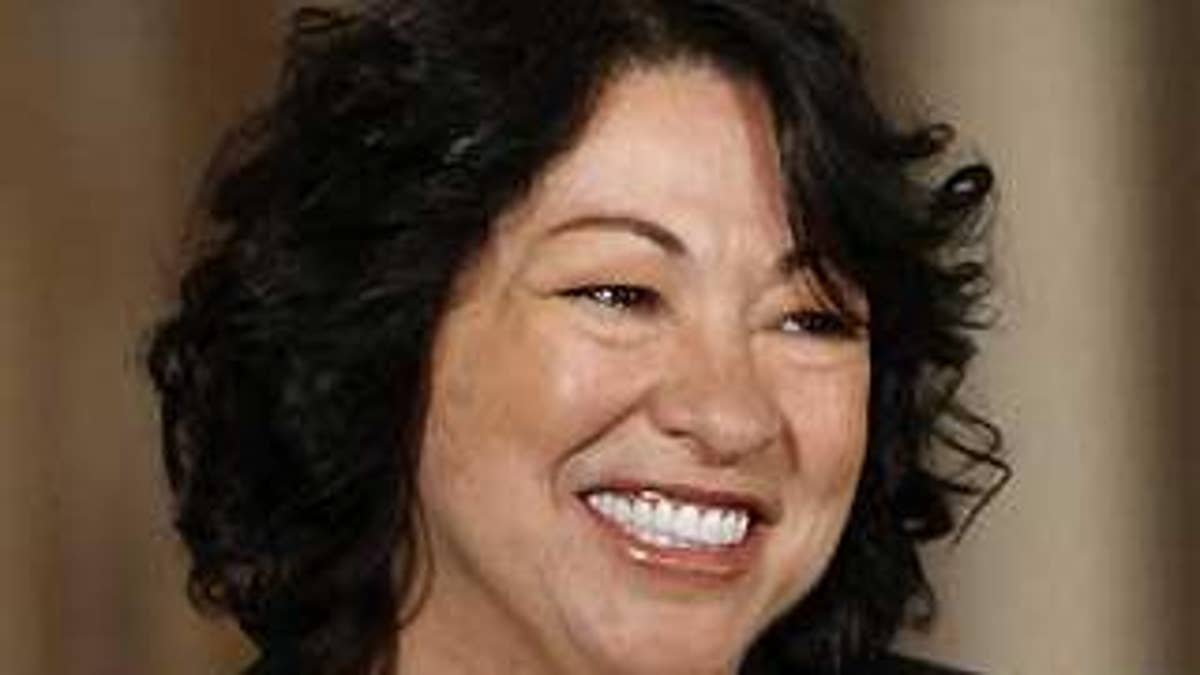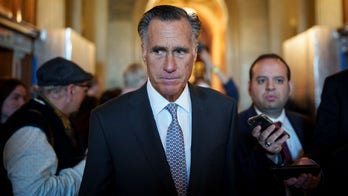
In touting the resume of his Supreme Court nominee on Tuesday, President Obama held up Sonia Sotomayor's role in ending the 1994-95 Major League Baseball strike, during which she issued a court injunction against team owners.
"Some say that Judge Sotomayor saved baseball," Obama said Tuesday, joking that she acted with a "swiftness much appreciated by baseball fans everywhere."
But Sotomayor's role in saving America's pastime will likely be a minor point as Republicans begin to take a closer look at her two decades on the bench, examining her record for signs of imprudent judicial activism and liberal bias.
Already, a few Republicans have cast doubt on Sotomayor's objectivity. And her history of decisions and opinions surely will raise more questions.
Sotomayor, who would be the court's first Hispanic member and third woman -- and who has touted her race and gender as an asset -- frequently has argued in favor of minority plaintiffs and points of view.
Though Obama said he was looking for a nominee who demonstrates empathy and a "common touch," some critics have cautioned against such criteria in a high court justice and issued reminders that the law must come first.
Rep. Lamar Smith, R-Texas, in a written statement, said Tuesday he's concerned Sotomayor has shown "personal bias based on ethnicity and gender."
"Judge Sotomayor will need to reassure the country that she will set aside her biases, uphold the rule of law and interpret the Constitution as written, not as she believes it should have been written," said Smith, who will have no vote in the matter, as the confirmation is a Senate matter.
Perhaps Sotomayor's most controversial decision was in Ricci v. DeStefano, in which she was part of a panel ruling against a group of white firefighters in New Haven, Conn. -- they objected after the city threw out the results of a promotion test because too many white firefighters, and not enough minority firefighters, scored high.
She and two other judges summarily dismissed the case without tackling the complex issues outlined in stacks of briefs and debated in extended oral arguments. Instead, the court issued an unsigned, one-paragraph opinion. Sotomayor's colleague, Judge Jose Cabranes, was so concerned that he wrote a lengthy dissent highlighting what many saw as an attempt to bury the case.
"This perfunctory disposition rests uneasily with the weighty issues presented by this appeal," he wrote.
The discrimination case was later kicked up to the Supreme Court, and a decision is expected by late June.
Sotomayor has a record of being rebuffed by the high court. Of the six decisions she was a part of that came before the high court, five were reversed. In the sixth, the court disagreed with Sotomayor's reasoning.
Senior administration officials said they have no concerns about the reversal rate or Sotomayor's position in the firefighter case. But that and other cases are now ripe for analysis.
-- In one case reversed by the Supreme Court, Sotomayor and the majority on the appeals court ruled that an inmate could sue a private corporation for injuries he suffered in a halfway house run by that company. Though the company operated the house on behalf of the Bureau of Prisons, Sotomayor argued that the company was not shielded from liability. The Supreme Court reversed the appeals court decision in 2001.
-- In another case, Sotomayor dissented in a 2006 opinion that rejected a challenge to a New York law denying convicted felons the right to vote. She argued in her own dissenting opinion that the state law "disqualifies a group of people from voting."
-- Sotomayor, in 2003, also wrote an opinion that reversed a district court decision that a Muslim inmate's rights were not violated when he was denied a holiday feast. Sotomayor argued that the inmate's First Amendment rights were violated because the feast was important to his religion.
-- In 1999, Sotomayor dissented in a decision to dismiss a case in which a black student claimed his school discriminated against him by transferring him mid-year from first grade to kindergarten. Sotomayor argued that the "lone black child" in the class was not given an "equal chance."
-- In 2007, Sotomayor wrote an opinion holding that the Environmental Protection Agency could not perform a cost-benefit analysis to determine the "best technology available." She wrote it could only consider cost as a factor in more limited ways. This decision, too, was overturned by the Supreme Court.
-- In 1993, Sotomayor threw out evidence obtained by police in a drug case, because a detective lied to obtain the search warrant -- prosecutors agreed to a plea bargain. However, during sentencing Sotomayor made controversial statements by criticizing the five-year mandatory sentence, calling it an "abomination" that the defendant did not deserve.
Sen. Jeff Sessions, R-Ala., later grilled her on this, suggesting it showed disrespect for the law, during her confirmation hearing a decade ago for the 2nd Circuit Court of Appeals.
Sessions was one of 11 sitting Republican senators who voted against her at the time. Now the ranking Republican on the Senate Judiciary Committee, Sessions on Tuesday said Sotomayor would get a "fair and respectful hearing."
But he said some conservatives who voted against her a decade ago felt she had a "history of activism."
"I think she needs to address that," Sessions told FOX News. "I think she's entitled to a full and fair new evaluation."
Sessions also released a written statement saying the Senate must determine whether Sotomayor understands that the "proper role of a judge is to act as a neutral umpire of the law, calling balls and strikes fairly without regard to one's own personal preferences or political views."
Arguably, her public statements may stir more controversy than her judicial decisions.
A YouTube video of Sotomayor speaking at Duke University about what some interpreted as judicial activism drew early fire for the judge.
In the video, she said: "All of the legal defense funds out there, they're looking for people with court of appeals experience" because "the court of appeals is where policy is made."
She also once said, "I would hope that a wise Latina woman with the richness of her experiences would more often than not reach a better conclusion than a white male who hasn't lived that life."
One administration official said critics who want to attack Sotomayor as a judicial activist must balance that against what the White House regards as a clear example of deferring to legal precedent -- in the New Haven firefighters case.
The official said Sotomayor merely followed Circuit Court precedent in that case, and exhibited judicial restraint.
Sotomayor's opinions also cannot be pigeonholed as exclusively liberal or conservative.
In 2002, she ruled against an abortion rights group that claimed the so-called "Mexico City Policy" -- which prohibited U.S. funding from going to foreign groups performing or supporting abortion services -- was a violation of the First Amendment and other rights.
The government is "free to favor the anti-abortion position over the pro-choice position," she held.
In another 2004 case, Sotomayor's opinion ruled in favor of anti-abortion protesters who claimed a town had improperly trained officers who allegedly used excessive force in arresting them. Plus she has sided against minority plaintiffs who brought discrimination cases to her court.
Sotomayor, speaking after Obama announced his decision to nominate her, said Tuesday that her underlying commitment is to the law.
"I firmly believe in the rule of law as the foundation for all of our basic rights," she said.
And she cited her personal story in her qualifications for the seat. She grew up in a Bronx housing project and lost her father at a young age. She later graduated from Princeton and Yale universities, earning her first appointment to the bench in 1992.
"This wealth of experiences, personal and professional, have helped me appreciate the variety of perspectives that present themselves in every case that I hear. It has helped me to understand, respect and respond to the concerns and arguments of all litigants who appear before me, as well as to the views of my colleagues on the bench," she said. "I strive never to forget the real world consequences of my decisions on individuals, businesses and government."
Supporters, including New York Sens. Chuck Schumer and Kirsten Gillibrand, touted her record and the fact that she would add diversity to the high court.
Schumer said Sotomayor is a "moderate" and that Obama "has not reached to the far left end of the spectrum" in his decision. He, too, cited her back-story as a qualification.
"It's a great New York story, and it's a great American story," Schumer said. "And she will give the courts a needed understanding of how ordinary Americans live."
A White House official said it's "absolutely essential" for the Senate to confirm Sotomayor before it adjourns for the summer recess on Aug. 10. Top administration officials predicted Sotomayor would "be very forthcoming" at her confirmation hearing.
FOX News' Major Garrett and Shannon Bream contributed to this report.
























